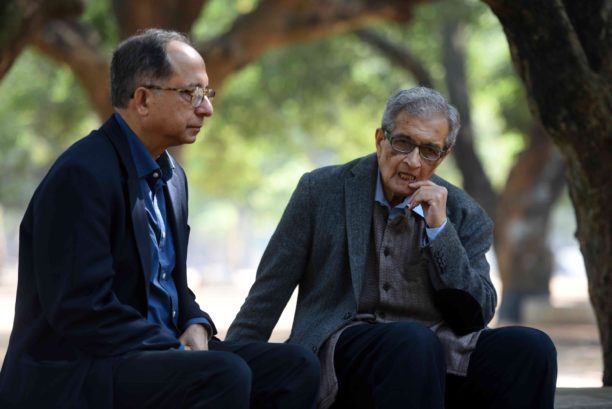 It might seem strange to juxtapose a documentary featuring an economist with a fictional feature about a family of filmmakers, but in some ways, both The Argumentative Indian and A Billion Colour Story have much in common; particularly, at their core, an examination of contemporary India and its concerns, whether political, cultural, or communal.
It might seem strange to juxtapose a documentary featuring an economist with a fictional feature about a family of filmmakers, but in some ways, both The Argumentative Indian and A Billion Colour Story have much in common; particularly, at their core, an examination of contemporary India and its concerns, whether political, cultural, or communal.
The Argumentative Indian takes its title from Nobel-winning Amartya Sen’s book of the same name, in which the Nobel Prize winning economist examines Indian culture and identity. The core of Sen’s argument lies in his belief in India as a place grounded in pluralism and intellectual debate. It’s a view that the parents of eleven-year-old Hari (Druva Padmakumar), Imran and Parvati, in the film A Billion Colour Story, would probably feel comfortable with. Filmmakers who met at school in Australia, self-described religious agnostics and ardent Indophiles, they return to India to make a movie. However, they soon find themselves at the centre of several controversies in the name of religious belief. Despite their continued difficulties in finding an affordable place to live (one place refuses them because Imran is assumed to be Muslim; another threatens to turf them out because Parvati is not), the challenges in finding funding for their film, and the threats to those close to them for beliefs and lifestyles that fundamentalists find threatening, they never seem to lose hope, at least not until events shake them to the very core of their own moderately held beliefs.
Director N. Padmakumar anchors his story with logic and debate, but he also fills it with warmth and, surprisingly, colour. I say “surprisingly”, because A Billion Colour Story is shot largely in black and white, at least until a pivotal moment in the film. India is, indeed, a place filled with a billion colours, and that makes it both beautiful and overwhelming. By choosing to shoot in shades of grey, N. Padmakumar skillfully does a couple of clever things: firstly, he puts everything and everyone in his film on an equal footing: there is no Muslim green or Hindu saffron, there isn’t a rainbow of colours to distract us, and we can focus intensely on the story unfolding on the screen. Secondly, when colour finally does bleed onto the screen, it serves to heighten the poignancy of the moment and those that follow.

I think I was grateful that I followed a screening of A Billion Colour Story with one of The Argumentative Indian, because I needed the documentary’s dry, dispassionate tone after becoming a complete emotional mess after Padmakumar’s film. If I had the pleasure of watching it in the theatre, I’d be the one weeping into a fistful of tissues, such is the emotional impact of the film. It’s hard not to become completely engaged with our narrator, Hari. He’s sweet and funny and thoughtful. He’s mature in many ways, yet still enough of a child to fuss and worry over his father’s safety, both physical and emotional: Hari is sad that his father seems to feel, as the film progresses, that India has lost its poetry, and he wants to find a way to help him recover that joy. He’s tech savvy in the way the younger generation is these days; yet still shy and sweet enough to feel awkward with Sophia, who wants to be his girlfriend.
Most importantly, Hari represents the kind of warmth and hope that will, I think, prove essential in the face of extremist views – not only in India, but elsewhere in the world, as politics in many places become highly polarized, and as the internet allows people the luxury of expressing the most extreme of views from a position of relative anonymity. Amartya Sen is certainly not wrong in believing that Indians need to remain “argumentative”; reason and logic are, indeed, essential tools in discussions of those things that most matter to us as human beings. But N. Padmakumar reminds us that reason and logic are powerless in the face of strongly held beliefs and emotions, and that we must combine the two in order to make change in the world.
I’m grateful to festivals such as London Indian Film Festival 2017 for programming films like An Argumentative Indian and A Billion Colour Story that challenge us to think, and that allow us to engage with them in interesting ways. Even when it costs us a box of tissues.









